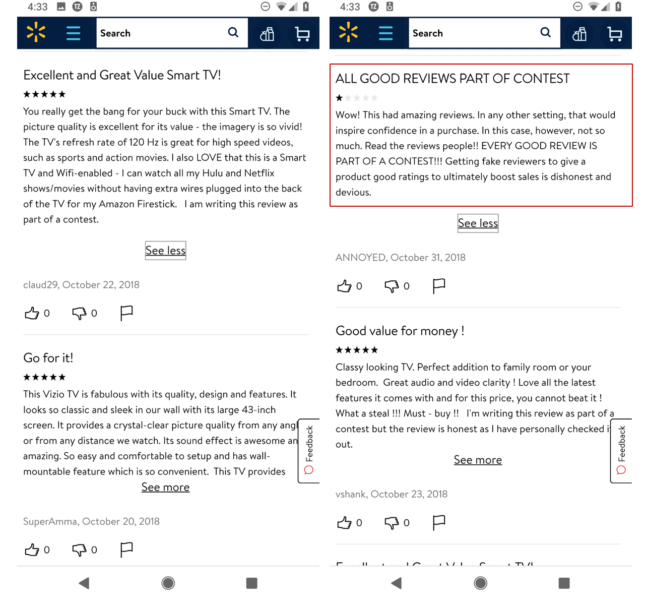Report: ‘Incentivized reviews’ effective for consumers and brands
While 58 percent of consumers were unaffected by the presence of an incentive, 42 percent were less willing to trust them.
No one disputes the importance of online reviews. Numerous surveys and reports document their influence on consumer purchases. A more controversial topic is how to capture reviews and what tactics are ethical and effective.
A new Bazaarvoice report featuring survey data from U.S. and French shoppers, 18 and older, discusses consumer reactions to “incentivized reviews” and whether they’re as effective for brands as those obtained without an incentive. All of those surveyed shopped online “multiple times per month.”
Bazaarvoice focuses on the the fact that a majority of consumers were willing to trust these reviews, but a substantial minority apparently were not. So the results are mixed.
The reviews continuum. On a kind of reviews continuum, there are purely “organic” reviews written without any brand prodding or incentives, solicited reviews without incentives (brands simply ask), incentivized reviews (e.g., contest or other perk offered), paid reviews and fake reviews.
One question worthy of debate is: are “incentivized” or paid reviews the same as “fake reviews.” Bazaarvoice and others might argue no, while Yelp would argue they are equivalent in that they may skew review content and thereby deceive consumers.
Google and Yelp have different strategies for catching fake reviews, with Yelp being more zealous in its effort to weed out what it perceives to be inauthentic review content.
Things that make reviews credible to consumers
Source: Bazaarvoice, n= 2,000 US and 1,000 French adults (2018)
Reviews matter most for high-consideration purchases. The Bazaarvoice survey found that “more than three in four U.S. (77 percent) and French (76 percent) online shoppers read product reviews before purchasing for more than half the products they buy.” That also goes for in-store shoppers, with Bazaarvoice saying that 45 percent of in-store shoppers read reviews before buying (there are surveys that show higher numbers as well).
Consumers appear to pay more attention to reviews in cases of high-consideration purchases: 88 percent of US online shoppers “believe ratings and reviews to be ‘extremely or very’ important when purchasing a high-consideration product.” That number drops to 42 percent for low consideration items.
Majority still trust incentivized reviews. Bazaarvoice sought to test the impact of “incentivized reviews” on consumers by presenting control and exposed groups with mock interfaces to determine their reactions. In this case, Bazaarvoice defines an incentivized review “as a product review written by a consumer that received compensation, such as a discount or free product, for writing that review. Incentivized reviews are typically noted that they are incentivized.” Incentivized reviews that weren’t disclosed as such would violate FTC guidelines.
Bazaarvoice says that the reviews shown were for products ranging from consumer electronics and appliances to everyday household items. The company found that 58 percent of U.S. shoppers in the survey were willing to trust incentivized reviews.
“In fact, more than half of U.S. and French online shoppers (58 percent and 56 percent, respectively) say that incentivized reviews can inform their purchase decision just as much as organic reviews can. The majority of respondents from both markets also agreed that incentivized reviews would be useful in terms of making a purchase decision if they were written for a product without many reviews yet. Whether or not reviewers were incentivized to offer their opinions, they are trusted by their peers,” according to the Report.
But, 4 out of 10 are less trusting. This means that 42 percent of the Bazaarvoice sample had a negative reaction or were less willing to trust these reviews. Coincidentally, I found the following reaction to incentivized reviews on Walmart’s site in connection with a specific Vizio TV. The reviews were almost entirely positive and obtained via a contest. One writer called them out as unreliable.

A user complaint about incentivized reviews on Walmart.com.
Reviews best practices. The Bazaarvoice report goes on to make best practices recommendations to merchants and marketers about incentivized reviews. Among them are the following:
- Never delete less favorable reviews and/or use fake ones.
- When incentivizing reviews via sampling, sweepstakes, coupons, or other tactics, be explicit in the request for honest feedback that will help other shoppers.
- Always label incentivized reviews.
- Ensure your review providers have strong processes and technologies in place to authenticate reviews before they’re published.
- Ensure that reviewers have actually interacted with the product.
Why it matters to marketers. Brands and marketers must be cautious about how they ask for reviews. The practices and incentives described by Bazaarvoice should only be used for reviews that will be featured on a brand or retailer’s website and never for reviews for third party platforms such as Google, Facebook, Yelp or TripAdvisor.
Any failure to disclose that reviews were obtained with incentives could result in fines and other penalties that will damage the brand’s reputation. Asking for reviews is a better practice than paying for them (in whatever form). But marketers must also be careful in how they do that and avoid the practice for Yelp reviews in particular.
Contributing authors are invited to create content for Search Engine Land and are chosen for their expertise and contribution to the search community. Our contributors work under the oversight of the editorial staff and contributions are checked for quality and relevance to our readers. The opinions they express are their own.
Related stories

